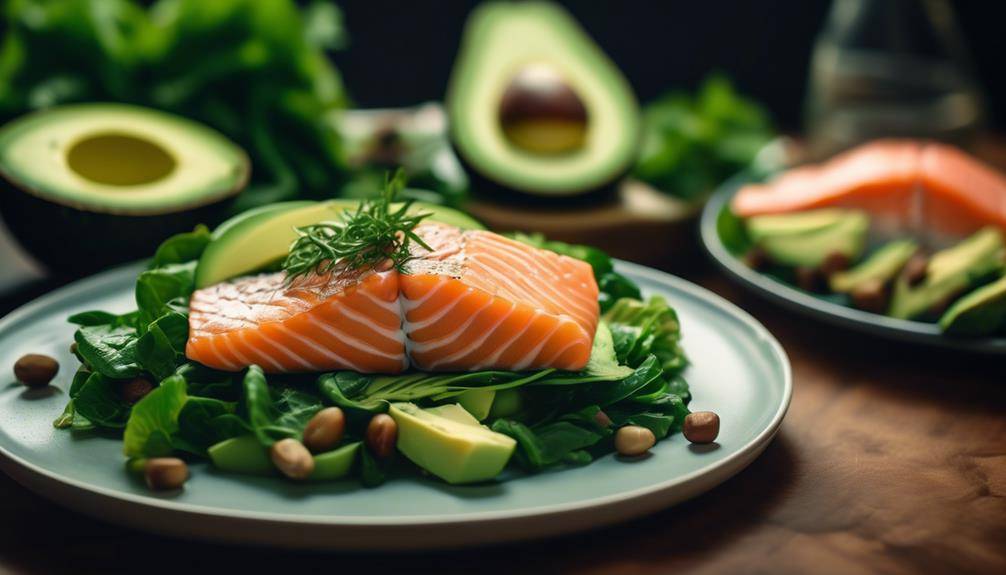How To Balance Nutrients in Ketogenic Diet Principles

Balance Nutrients in Ketogenic Diet; Imagine yourself standing on a tightrope, delicately balancing your weight as you teeter between two extremes. Now, imagine this tightrope as your ketogenic diet, where the delicate balance lies in the nutrients you consume.
It’s not just about cutting out carbs and increasing fats; it’s about ensuring that you’re nourishing your body with the right amounts of macronutrients, micronutrients, electrolytes, fiber, vitamins, and minerals. But how do you achieve this delicate balance? How do you ensure that you’re getting everything your body needs while sticking to the principles of a ketogenic diet? In this discussion, we will explore the strategies and techniques to help you maintain equilibrium in your nutrient intake, keeping you on the path to optimal health and wellness.
Understanding the Ketogenic Diet Basics
To understand the basics of the ketogenic diet, you need to know how it works and what it entails. The ketogenic diet is a low-carbohydrate, high-fat diet that has gained popularity for its potential weight loss and health benefits. By drastically reducing carbohydrate intake and increasing fat consumption, the body enters a state of ketosis, where it primarily burns fat for fuel instead of carbohydrates.
One of the main benefits of the ketogenic diet is its ability to promote weight loss. When you restrict carbohydrates, your body starts using stored fat as its main source of energy. This can lead to significant fat loss, especially in stubborn areas like the belly. Additionally, the ketogenic diet can help control hunger and reduce cravings, leading to a decreased calorie intake.
Contrary to common misconceptions, the ketogenic diet does not mean you can eat unlimited amounts of bacon and butter. It emphasizes healthy fats from sources like avocados, nuts, and olive oil, along with moderate amounts of protein from sources like meat, fish, and eggs. It also encourages the consumption of non-starchy vegetables to provide essential nutrients and fiber.
Another misconception is that the ketogenic diet is unsustainable or harmful. While it may require some adjustment in the beginning, many people find it manageable in the long term. It has been shown to improve various health markers, such as blood sugar control, insulin sensitivity, and cholesterol levels. However, it is important to note that the ketogenic diet may not be suitable for everyone, especially those with certain medical conditions.
Essential Macronutrients for a Balanced Ketogenic Diet
To maintain a balanced ketogenic diet, it is important to understand the macronutrient ratios for achieving and maintaining ketosis. This involves consuming a high amount of healthy fats, a moderate amount of protein, and a low amount of carbohydrates. Additionally, it is crucial to ensure that you are meeting your micronutrient needs by incorporating a variety of nutrient-dense foods into your diet.
Macronutrient Ratios for Ketosis
Achieving a balanced ketogenic diet requires careful consideration of the macronutrient ratios that promote ketosis while providing essential nutrients. The macronutrient distribution in a ketogenic diet typically consists of high fat, moderate protein, and low carbohydrate intake. Here are some key points to keep in mind when determining your macronutrient ratios for ketosis:
- Fat intake: Aim for 70-75% of your daily calories to come from healthy fats such as avocados, nuts, and olive oil.
- Protein intake: Consume around 20-25% of your daily calories from protein sources like meat, fish, and dairy products.
- Carbohydrate intake: Limit your carbohydrate intake to approximately 5-10% of your daily calories, primarily from non-starchy vegetables.
- Nutritional ketosis indicators: Measure your ketone levels using urine, blood, or breath tests to ensure you are in a state of ketosis.
- Individual adjustments: It’s important to personalize your macronutrient ratios based on your specific needs and goals, as everyone’s body responds differently to different ratios.
Meeting Micronutrient Needs
One way to ensure a balanced ketogenic diet is by meeting your micronutrient needs through essential macronutrients. While the focus of a ketogenic diet is on macronutrient ratios, it is important not to overlook the importance of micronutrients. Micronutrient deficiencies can occur when the diet lacks variety or when certain food groups are restricted. To prevent these deficiencies, it is crucial to include a wide range of nutrient-dense foods in your diet.
Nutrient-dense foods such as leafy greens, nuts and seeds, avocados, and fatty fish are rich in vitamins, minerals, and antioxidants that support optimal health. It is recommended to consult with a healthcare professional or registered dietitian to ensure you are meeting your specific micronutrient needs while following a ketogenic diet.
Importance of Micronutrients in a Ketogenic Diet
Micronutrients play a crucial role in supporting optimal health and well-being while following a ketogenic diet. Although the focus of a ketogenic diet is typically on macronutrients like fats, proteins, and carbohydrates, it is important not to overlook the importance of micronutrients. These essential vitamins and minerals are necessary for various bodily functions and can help prevent micronutrient deficiencies. Here are five reasons why micronutrients are important in a ketogenic diet:
- Supports overall health: Micronutrients such as vitamins and minerals are essential for the proper functioning of the body. They play a key role in supporting immune function, energy production, and maintaining healthy skin, hair, and nails.
- Promotes nutrient absorption: Micronutrients are involved in the process of nutrient absorption in the body. They help convert food into energy, facilitate the breakdown of macronutrients, and support the absorption of essential nutrients like iron, calcium, and vitamin D.
- Prevents micronutrient deficiencies: Following a ketogenic diet can sometimes lead to micronutrient deficiencies, as certain food groups may be restricted. Adequate intake of micronutrients can help prevent deficiencies and their associated health risks.
- Supports brain health: Micronutrients like B vitamins, omega-3 fatty acids, and antioxidants are important for brain health. They support cognitive function, help reduce inflammation, and protect against oxidative stress.
- Enhances athletic performance: Micronutrients are essential for optimal athletic performance. They support muscle function, aid in recovery, and help maintain electrolyte balance, which is important for hydration and muscle contraction.
Balancing Electrolytes on a Ketogenic Diet
To maintain electrolyte balance on a ketogenic diet, it is important to focus on sodium and potassium intake. Sodium is crucial for maintaining fluid balance and preventing dehydration, while potassium helps regulate heart function and muscle contractions. Additionally, magnesium plays a vital role in energy production and muscle function, making it essential to monitor magnesium levels while following a ketogenic diet.
Sodium and Potassium Balance
Maintaining a delicate balance of sodium and potassium is crucial for ensuring proper electrolyte levels on a ketogenic diet. Here are some key points to consider when managing sodium and potassium balance:
- Sodium and potassium supplementation: On a ketogenic diet, your body excretes more sodium through urine. Therefore, it is important to increase your sodium intake to prevent deficiencies. Adding sea salt to your meals or consuming bone broth can help replenish sodium levels.
- Potassium-rich foods: Incorporating foods like avocados, spinach, and mushrooms into your diet can help boost your potassium levels. These foods not only provide essential nutrients but also contribute to maintaining electrolyte balance.
- Hydration: Drinking enough water is crucial for maintaining electrolyte balance. Adequate hydration helps prevent imbalances and supports overall health.
- Monitoring symptoms: Pay attention to signs of electrolyte imbalances, such as muscle cramps, fatigue, or irregular heartbeats. If you experience these symptoms, adjust your sodium and potassium intake accordingly.
- Consult a healthcare professional: If you have concerns about managing electrolyte imbalances on a ketogenic diet, it is always advisable to seek guidance from a healthcare professional to ensure you’re meeting your nutritional needs.
Importance of Magnesium
After addressing the sodium and potassium balance, it is important to understand the significance of magnesium in maintaining electrolyte balance on a ketogenic diet. Magnesium is a vital mineral that plays a crucial role in various physiological processes. It is involved in energy production, protein synthesis, and nerve function. On a ketogenic diet, magnesium supplementation may be necessary due to increased excretion of electrolytes through urine. Low levels of magnesium can lead to muscle cramps, fatigue, and irregular heartbeat.
To ensure sufficient magnesium intake, you should consider incorporating magnesium-rich foods into your diet. Examples of magnesium-rich foods include leafy green vegetables, nuts, seeds, and fish. Additionally, magnesium supplements can be taken under the guidance of a healthcare professional to maintain optimal electrolyte balance on a ketogenic diet.
Incorporating Fiber for Gut Health on a Ketogenic Diet
Incorporating an adequate amount of fiber into your ketogenic diet is crucial for maintaining optimal gut health. While the focus of a ketogenic diet is on low carbohydrate intake, it’s important not to neglect fiber, as it plays a vital role in supporting a healthy gut microbiome. Here are five fiber sources you can incorporate into your ketogenic diet:
- Chia seeds: These tiny seeds are packed with fiber and can be easily added to smoothies, yogurt, or used as a topping for salads and desserts.
- Flaxseeds: Another great source of fiber, flaxseeds can be ground and added to baked goods or sprinkled over your meals.
- Non-starchy vegetables: Vegetables like broccoli, cauliflower, spinach, and zucchini are not only low in carbs but also high in fiber. Incorporate them into your meals to increase your fiber intake.
- Avocado: Besides being a healthy source of fats, avocados are also rich in fiber. Enjoy them sliced on top of salads or mashed as a spread.
- Coconut flour: Made from dried coconut meat, coconut flour is a low-carb, high-fiber alternative to traditional flours. It can be used in baking or as a coating for fried foods.
Fiber is essential for maintaining a healthy gut microbiome as it provides nourishment for the beneficial bacteria in your digestive system. These bacteria play a crucial role in various aspects of your health, including immune function and nutrient absorption. By incorporating fiber-rich foods into your ketogenic diet, you can support the diversity and growth of these beneficial bacteria, promoting a healthy gut and overall well-being. Remember to drink plenty of water and gradually increase your fiber intake to avoid digestive discomfort.
Navigating Essential Vitamins and Minerals in a Ketogenic Diet
To ensure optimal nutrition on a ketogenic diet, it is important to carefully consider the intake of essential vitamins and minerals. While the focus of a ketogenic diet is on high fat and low carbohydrate intake, it’s crucial to also pay attention to micronutrients to prevent deficiencies and maintain overall health. Due to the restricted food choices on a ketogenic diet, some essential vitamins and minerals may be lacking, making vitamin supplementation a potential option.
One of the common micronutrient deficiencies in a ketogenic diet is magnesium. Magnesium plays a vital role in various bodily functions, including energy metabolism and muscle function. Low magnesium levels can lead to symptoms such as muscle cramps and fatigue. To ensure sufficient magnesium intake, consider incorporating magnesium-rich foods like spinach, almonds, and avocado into your diet. Additionally, taking a magnesium supplement may be beneficial.
Another important vitamin to consider is vitamin D. Vitamin D is crucial for bone health, immune function, and overall well-being. Since many natural sources of vitamin D, such as dairy products and certain fatty fish, are limited on a ketogenic diet, it’s important to ensure adequate intake. Sunlight exposure is the best source of vitamin D, but if that is not possible, a vitamin D supplement may be necessary.
Lastly, it is essential to monitor your intake of B vitamins on a ketogenic diet. B vitamins are involved in energy production and brain function. Foods like meat, fish, and eggs are good sources of B vitamins, but careful attention must be paid to ensure adequate intake.
Strategies for Optimizing Nutrient Intake on a Ketogenic Diet
To maximize nutrient intake while following a ketogenic diet, it is essential to implement effective strategies that ensure a well-rounded and balanced approach to your dietary choices. Here are some strategies for optimizing nutrient intake on a ketogenic diet:
- Plan your meals: Planning your meals in advance can help you ensure that you are meeting your nutrient needs. Include a variety of foods from different food groups to ensure you are getting a wide range of nutrients.
- Focus on nutrient-dense foods: Choose foods that are rich in nutrients to maximize your nutrient intake. Include plenty of non-starchy vegetables, lean proteins, and healthy fats in your meals.
- Supplement wisely: While it is best to get your nutrients from whole foods, certain nutrients may be difficult to obtain in adequate amounts on a ketogenic diet. Consider talking to a healthcare professional about potential supplements to ensure you are meeting your nutrient needs.
- Stay hydrated: Drinking enough water is important for overall health and can help manage cravings. Aim to drink at least 8 glasses of water per day, or more if you are physically active.
- Manage cravings: Cravings can be a challenge on a ketogenic diet, but there are strategies you can use to manage them. Opt for low-carb, high-fat snacks such as nuts, seeds, or avocados when cravings strike. Additionally, staying hydrated and getting enough sleep can help reduce cravings.
Balance Nutrients in Ketogenic Diet ; Frequently Asked Questions
Can I Consume Carbohydrates on a Ketogenic Diet?
You can consume carbohydrates on a ketogenic diet, but in limited amounts. Carb cycling can be beneficial for some individuals on a ketogenic diet, as it allows for occasional carb intake while still maintaining ketosis.
How Can I Ensure I Am Getting Enough Protein on a Ketogenic Diet?
To ensure you’re getting enough protein on a ketogenic diet, incorporate protein sources like meat, poultry, fish, eggs, and cheese. Aim for a moderate protein intake that supports muscle maintenance and overall health.
What Are Some Common Sources of Healthy Fats on a Ketogenic Diet?
To ensure you’re getting enough healthy fats on a ketogenic diet, common sources include avocados, nuts and seeds, olive oil, coconut oil, and fatty fish like salmon. Incorporating MCT oil can provide additional benefits, while omega 3 fatty acids also play a crucial role.
Are There Any Specific Micronutrients That Are Especially Important on a Ketogenic Diet?
To maintain a healthy ketogenic diet, it’s important for you to consider specific nutrient requirements and potential nutrient deficiencies. Balancing your intake of micronutrients is crucial to support overall health and prevent deficiencies.
How Can I Prevent Electrolyte Imbalances While Following a Ketogenic Diet?
To prevent electrolyte imbalances, it’s important to supplement with necessary electrolytes like sodium, potassium, and magnesium. These supplements can help maintain proper balance and prevent symptoms such as muscle cramps and fatigue.
Conclusion: Balance Nutrients in Ketogenic Diet
In conclusion, balancing nutrients is crucial for a successful ketogenic diet. By understanding the basics of this diet and ensuring the right macronutrient ratios, as well as incorporating essential micronutrients, electrolytes, fiber, and vitamins and minerals, individuals can optimize their nutrient intake and support overall health while following a ketogenic eating plan. This evidence-based approach will help individuals achieve their goals and maintain a balanced ketogenic diet.








